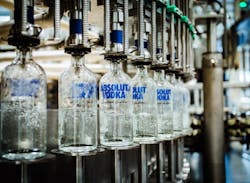Absolut Vodka and Ardagh to use Hydrogen-fired furnace for bottle production
Pernod Ricard’s Absolut Vodka brand has signed an agreement with Ardagh Glass Packaging, a subsidiary of the Ardagh Group, in Limmared, Sweden to transition to a partly hydrogen-fired furnace for bottle production.
This means a full-scale change of the continuous production of Absolut bottles for all markets globally.
The furnace will begin running on 20% green gas from the second half of 2023. The hydrogen used in the furnace will be produced onsite by Ardagh, reportedly using renewably sourced electricity.
The hydrogen energy-fired glass furnace will reduce Absolut Vodka’s carbon footprint from bottle production by 20% and contribute to its goal of becoming carbon neutral by 2030.
Related stories
Diageo Canadian Whiskey Distillery promising 100 percent Renewable Energy
Bacardi Rum CHP plant shifting from Fuel Oil to Propane to cut Emissions
H2 Boiler Technology to provide Carbon-free Heat for Scottish Whiskey maker
“The glass manufacturing industry is on a transformative journey, and the world can’t wait for the perfect solution,” The Absolut Company’s Chief Executive Officer Stéphanie Durroux, said. “ A bold and innovative approach is needed to accelerate radical change that will help solve the significant sustainability challenges that all glassmakers and buyers of glass face.”
The deal with Ardagh Group follows the successful production of Pernod Ricard’s Jameson Irish Whiskey bottles using biofuels.
“These exciting partnerships, which we are delighted to unveil in the lead up to the COP27, are key to accelerating our sustainability journey,” Vanessa Wright, Chief Sustainability Officer at Pernod Ricard said. “ True to our vision ‘Créateurs de convivialité’, we strongly believe in working with others to strengthen what we do collectively and drive innovation for a greener future, in line with our 2030 Sustainability & Responsibility roadmap ‘Good Times from a Good Place’”.
Pernod Ricard has also joined the not-for-profit research and technology organisation Glass Futures, which aims to decarbonize the glass making process.
About the Author
EnergyTech Staff
Rod Walton is head of content for EnergyTech.com. He has spent 17 years covering the energy industry as a newspaper and trade journalist.
Walton formerly was energy writer and business editor at the Tulsa World. Later, he spent six years covering the electricity power sector for Pennwell and Clarion Events. He joined Endeavor and EnergyTech in November 2021.
He can be reached at [email protected].
EnergyTech is focused on the mission critical and large-scale energy users and their sustainability and resiliency goals. These include the commercial and industrial sectors, as well as the military, universities, data centers and microgrids.
Many large-scale energy users such as Fortune 500 companies, and mission-critical users such as military bases, universities, healthcare facilities, public safety and data centers, shifting their energy priorities to reach net-zero carbon goals within the coming decades. These include plans for renewable energy power purchase agreements, but also on-site resiliency projects such as microgrids, combined heat and power, rooftop solar, energy storage, digitalization and building efficiency upgrades.
